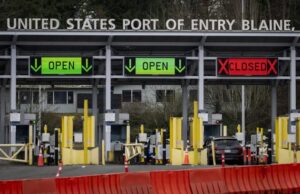
More than 9,000 members of the Public Service Alliance of Canada (PSAC) who work for the Canada Border Services Agency (CBSA) have voted overwhelmingly for a strike mandate, the union said Friday.
This could lead to significant disruptions to the flow of goods, services, and people at Canadian ports of entry during the busy summer season.
Strike votes held from April 10 to May 23 shpwed 96 per cent of members are in favour of taking job action, the PSAC says.
“Taking job action is always a last resort, but this strong strike mandate underscores that our members are prepared do what it takes to secure a fair contract,” Chris Aylward, PSAC National President, said in a statement. “Unless they want a repeat of 2021, Treasury Board and CBSA must be prepared to come to the table with a fair offer that addresses our key issues.”
Job action by CBSA workers in 2021 ended following a 36-hour bargaining session following major delays at airports and borders across the country, prompted by a near standstill of commercial cross-border traffic.
Workers impacted by the strike notice include border services officers at airports, land entry points, marine ports, and commercial ports of entry, inland enforcement officers, intelligence officers, investigators, trade officers, and non-uniformed headquarters staff.
According to PSAC, workers have been without a contract for over two years. Members claim the Treasury Board and CBSA and still not ready to negotiate an agreement that protects workers, and continue to demand concessions at the bargaining table.
The union says key issues in this round of bargaining are fair wages aligned with other Canadian law enforcement agencies, flexible telework and remote work options, equitable retirement benefits, and stronger protectors around discipline, technological change, and hours of work.
“Our members’ response to this vote has been unprecedented — we extended the voting period to meet the overwhelming demand from workers,” said Mark Weber, CIU National President, in a release. “We’re sending a clear message to the employer: we’re prepared to fight for fair wages, equitable retirement and to make CBSA a better place to work.”
The last meeting between the two parties was at a Public Interest Commission hearing last month. A report from the commission is expected to be released in the coming days.
Mediation sessions are set to begin on June 3 to find a solution to the bargaining impasse, PSAC says.
“We’re committed to reaching a fair contract that protects workers and improves working conditions for our members,” said Aylward. “As summer travel season nears, we hope the Trudeau Liberal government is making these negotiations a top priority. The window to avert a strike is closing quickly.”
In a statement, the federal government says it is “fully committed” to reaching a fair and reasonable agreement for border services employees.
“We recognize that labour action is a legitimate part of collective bargaining,” it said. “Employees have the right to strike, but at this time it is unnecessary. We are ready and willing to return to the bargaining table at any time.”
The government says there are over 9,500 represented border services group employees at the CBSA and 90 per cent of them work in positions deemed essential which means they have to continue providing services during a strike.








